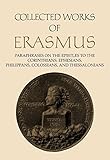Collected Works of Erasmus : Paraphrases on the Epistles to the Corinthians, Ephesians, Philippans, Colossians, and Thessalonians, Volume 43 / Desiderius Erasmus; ed. by Robert D. Sider.
Material type: TextSeries: Collected Works of Erasmus ; 43Publisher: Toronto : University of Toronto Press, [2009]Copyright date: ©2009Edition: Volume 43Description: 1 online resource (760 p.)Content type:
TextSeries: Collected Works of Erasmus ; 43Publisher: Toronto : University of Toronto Press, [2009]Copyright date: ©2009Edition: Volume 43Description: 1 online resource (760 p.)Content type: - 9780802092960
- 9781442687226
- 199.492
- BS2637 .E7 2009eb
- online - DeGruyter
| Item type | Current library | Call number | URL | Status | Notes | Barcode | |
|---|---|---|---|---|---|---|---|
 eBook
eBook
|
Biblioteca "Angelicum" Pont. Univ. S.Tommaso d'Aquino Nuvola online | online - DeGruyter (Browse shelf(Opens below)) | Online access | Not for loan (Accesso limitato) | Accesso per gli utenti autorizzati / Access for authorized users | (dgr)9781442687226 |
restricted access online access with authorization star
http://purl.org/coar/access_right/c_16ec
As part of his effort to make the Bible an effective instrument of reform in society, church, and everyday life, Erasmus composed the Paraphrases. In these series of texts, the Holy Scripture provides the core of a work that is vastly expanded to embrace the reforming "philosophy of Christ" in all of its forms. This volume contains two sets of Paraphrases, one on the Corinthian letters (circa. 1519), and the other on the group of letters from the Ephesians to the Thessalonians (circa. 1520). The first set presents an epistolary narrative which not only enlivens the events described but revisits them from a sixteenth-century perspective. Together, they form a sharpened portrait of the primitive Corinthian church and an intriguing critique of the church as it was in Erasmus's time. The second set, Ephesians to Thessalonians, offers an interpretation of Pauline theology with humanistic overtones that are distinctively Erasmian. In these Paraphrases, we see the craft of the philologist at work in the articulation of the doctrine of the Trinity, the humanist depicting Christ with an unmistakably human sensibility, and the artist discussing familiar theological virtues of faith and love in a new way. Apart from providing the first complete English translations of these Paraphrases since 1549, this volume gives excellent insight into the fundamentals of Erasmian theology and includes annotations which highlight the historical and linguistic implications of Erasmus's original texts.
Mode of access: Internet via World Wide Web.
In English.
Description based on online resource; title from PDF title page (publisher's Web site, viewed 01. Nov 2023)


